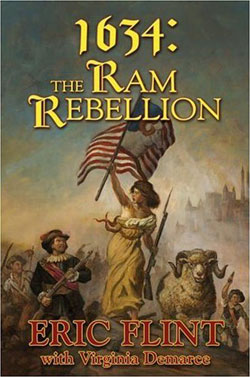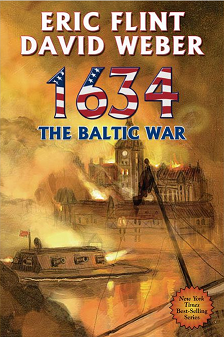
Baen Books is an American publishing house for science fiction and fantasy. In science fiction, it emphasizes space opera, hard science fiction, and military science fiction. The company was established in 1983 by science fiction publisher and editor Jim Baen. After his death in 2006, he was succeeded as publisher by long-time executive editor Toni Weisskopf.

Eric Flint was an American author, editor, and e-publisher. The majority of his works are alternate history science fiction, but he also wrote humorous fantasy adventures. His works have been listed on The New York Times, The Wall Street Journal, The Washington Post, and Locus magazine best-seller lists. He was a co-founder and editor of the Baen Free Library.

The 1632 series, also known as the 1632-verse or Ring of Fire series, is an alternate history book series and sub-series created, primarily co-written, and coordinated by American author Eric Flint and published by Baen Books.

Ring of Fire is the third published book by editor-author-historian Eric Flint of the 1632 series, an alternate history series begun in the novel 1632. The Ring of Fire is both descriptive of the cosmic event as experienced by the series' characters, but also is at times used as the name for the series itself. The series is set in war-torn Europe during the middle of the Thirty Years' War.

1633 is an alternate history novel co-written by American authors Eric Flint and David Weber published in 2002, and sequel to 1632 in the 1632 series. 1633 is the second major novel in the series and together with the anthology Ring of Fire, the two sequels begin the series hallmarks of being a shared universe with collaborative writing being very common, as well as one that, far more unusually, mixes many canonical anthologies with its works of novel length. That is because Flint wrote 1632 as a stand-alone novel, though with enough "story hooks" for an eventual sequel, and because Flint feels "history is messy" and the books reflect that real life is not a smooth, polished linear narrative flow from the pen of some historian but is instead clumps of semi-related or unrelated happenings that somehow sum up how different people act in their own self-interests.

1634: The Ram Rebellion is the seventh published work in the 1632 alternate history book series, and is the third work to establish what is best considered as a "main plot line or thread" of historical speculative focus that are loosely organized and classified geographically. The initial main thread is called the "Western and North-Central Europe thread" ; the second plot line, encompassing events in Italy, Spain, the Mediterranean region, and France, the "South European thread", and this book can be considered the starting novel of the "South-Central/South-East thread" being set in southern Germany, Austria, Bavaria, and Bohemia. This geographically organized plot thread actually began in Ring of Fire in Flint's novelette "The Wallenstein Gambit" which is set in Bohemia, Austria, and Germany, which tied into stories in various Grantville Gazettes.
The Grantville Gazettes were a series of anthologies of short stories set in the 1632 universe introduced in Eric Flint's novel 1632 that was published as a bi-monthly electronic magazine from 2003 until shortly after Flint's death in 2022.

Grantville Gazette II is the third collaborative anthology published in print set in the 1632-verse shared universe in what is best regarded as a canonical sub-series of the popular alternate history that began with the February 2000 publication of the hardcover novel 1632 by author-historian Eric Flint. Baen Books and Flint decline the distinction, counting this book as the sixth published work. Overall it is also the third anthology in printed publication in the atypical series, which consists of a mish-mash of main novels and anthologies produced under popular demand after publication of the initial novel, which was written as a stand-alone work.

1635: The Cannon Law is the sixth book and fifth novel published in the 1632 series by Eric Flint and Andrew Dennis. It is the second novel in the French-Italian plot thread, which began with 1634: The Galileo Affair and was published by Baen Books in 2006. The book explores the reactions of the Roman Catholic hardliners to Pope Urban VIII's actions in tolerating the new freedom of religion taking root in Central Europe during the climax of The Galileo Affair.

1634: The Baltic War is a sequel to both the first-of-type sequels, Ring of Fire and 1633, co-written by American authors Eric Flint and David Weber published in 2007. It had to await schedule co-ordination by the two authors, which proved difficult and delayed the work by nearly two years. It continues theMain or Central European thread centered on the newly organized United States of Europe birthed in Central Germany under the protection-by-arms of Emperor Gustavus Adolphus and in particular, the role of the citizens of Grantville, now of Thuringia, and the capital city of Magdeburg have to play on the world stage. With the stability imposed by the protection of Gustavus's armies, up-timers began migrating to other locales in the "neohistories" world as the year 1633 closed.

1634: The Bavarian Crisis is a novel in the alternate history 1632 series, written by Virginia DeMarce and Eric Flint as sequel to Flint's novella "The Wallenstein Gambit"; several short stories by DeMarce in The Grantville Gazettes; 1634: The Ram Rebellion; and 1634: The Baltic War. The novel's first draft was completed in 2005, before work on The Baltic War began. Many chapters of that "early draft version" were available on line, but the final production reached print on October 1, 2007.

Virginia Easley DeMarce is an American historian who specializes in early modern European history, as well as a New York Times Best Selling author in the 1632 series collaborative fiction project. She has done genealogical work on the origins of the Melungeon peoples.

Ring of Fire II is a 2008 anthology created by editor-author-historian Eric Flint. It is the second anthology in the 1632 series following after Ring of Fire (2004).
The Assiti Shards series is a fictional universe invented by American author Eric Flint. It is a shared universe concerning several alternate history worlds, related to a prime timeline. The defining characteristic of the fictional universe is the existence of the "Assiti Shards effect", and the impact that strikes by Assiti Shards have on characters in the stories. The series is rather large and expansive, having started publication in 2000, and as of 2008, consisting of 15 print books, and 21 e-magazine anthologies, in two different published timelines of the same multiverse.

1635: The Dreeson Incident (2008) is a novel in the alternate history 1632 series, written by Virginia DeMarce and Eric Flint, as a sequel to Flint's novella 1634: The Bavarian Crisis.

1635: The Tangled Web is a novel in the alternate history 1632 series, written by Virginia DeMarce.

1636: The Saxon Uprising is an alternate history novel by Eric Flint in the 1632 series, first published in hardcover by Baen Books on March 29, 2011, with a paperback edition following from the same publisher in March 2012. It is a direct continuation of 1635: The Eastern Front. The threads mentioned in this novel are taken up in 1637: The Polish Maelstrom.

1635: The Eastern Front is an alternate history novel by Eric Flint in the 1632 series, first published in hardcover by Baen Books on October 5, 2010, with a paperback edition following from the same publisher in November 2011. It is a sequel to 1635: The Tangled Web and is directly continued by 1636: The Saxon Uprising.

1636: The Kremlin Games is a novel in the 1632 series written by Gorg Huff and Paula Goodlett along with Eric Flint. It is the fourth book in the series to be listed on the New York Times bestseller list for hardcover fiction. This book reached number 30 on the NY Times list during a single week in June 2012. Besides being listed on the NY Times Best Seller list, 1636: The Kremlin Games was also listed on the Locus Hardcovers Bestsellers List for the month of September in 2012 at number 6.
This is complete list of works by American science fiction and historical fiction author Eric Flint (1947–2022).

















